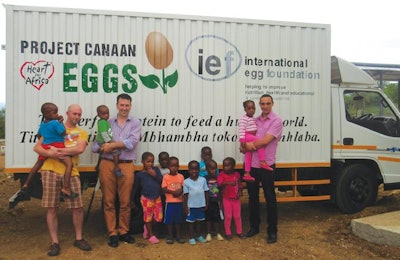
The Project Canaan egg farm in Swaziland has been up and running for more than a year and a half, providing a high-quality protein to children and supplying eggs to the local community, but that does not mean its supporters’ work is done.
The initiative continues to grow and expand, supplying eggs and expertise to an ever-wider area, transferring skills to allow people in need to help themselves, and setting its sights on expanding horizons.
The farm itself was the first step of the project, said Julian Madeley, managing director of the International Egg Foundation (IEF), which is supporting lead partners Heart for Africa and Egg Farmers of Canada.
Capacity at the farm has doubled through construction of a second house, and this means that, in addition to supplying the orphanage, 4,000 children can now be supplied with an egg, which is done via 31 church feeding stations.
This second house has been an important step in the project’s evolution in that output has been increased, but eggs still need to reach the communities where they are needed.
Addressing challenges
“There have been two major challenges,” said Madeley. “One is Swaziland’s road network, which is often simply dirt tracks or unlaid roads, and this makes transporting uncooked shell eggs difficult.
“To solve this, we have installed a boiling plant, donated by Sanovo Technology and, in this way, eggs arrive undamaged. Eggs are delivered to children who can simply peel them. This is important, as it means there is no need for cooking equipment, important particularly as many households are actually headed by children.
“Our second challenge is that we are looking at extending shelf life so that we can reach more areas. How we treat the boiled eggs can extend shelf life up to two weeks, and this is a key factor where there is no cold chain.”

The egg boiling machine allows eggs to be transported over greater distances and often difficult terrain. | Courtesy IEF
Beyond supplying children in the short term, the project is seeking to address a lack of skills and practical knowledge to ensure that its work leads to sustainable results.
Madeley explains that there is no culture of modern egg farming in rural Swaziland and that, to address this, expertise has been drawn from various sources, locally and from overseas.
For example, Eagle’s Nest, one of the country’s largest modern egg producers, in addition to selling vaccinated pullets and quality feed to the Project Canaan farm, is also supplying training. Egg Farmers of Canada has sent egg farmers on secondment, and technical and veterinary support is being given by Lohmann Tierzucht and South African vets.
Looking further ahead, the IEF is exploring how technology can be used to share and extend knowledge, and is working with the computer and rural departments of a U.K. university to see how farm performance can be monitored and improved, and best practices shared.
More than food alone
Modern technology can be deployed in Africa to ensure that egg production is as efficient as possible -- an important consideration when, in many areas, even plant-based food resources may be limited.
But the humble egg really can change lives. Many people in Africa still have a starch-based diet, but animal protein is considered important for a properly functioning immune system. This has implications where vaccination is concerned, and for those living with HIV and taking antiretrovirals.
“It will be regions rather than countries that we look at, to really reach those in most need. We are not building a series of farms, but showing what can be done, linking the various parts of the chain together. We want to encourage both the production and consumption of eggs across the continent, to be a facilitator and a multiplier.
“The first step has been Swaziland, but our ambition is bigger and broader, fundamentally to help others to help themselves,” Madeley said.

Eggs have the potential to save lives, but they must reach those who need them. | Courtesy IEF
How you can help feed undernourished children
A message from Julian Madeley, managing director of the International Egg Foundation
The International Egg Foundation is your egg foundation, working on behalf of egg farmers and the whole egg industry internationally, but the success of the Foundation needs the whole industry to work together.
We have achieved some significant successes already in Africa, but there is a lot more that needs to be done.
Taking these projects forward needs the talent, expertise and technology already enjoyed by the commercial egg industry and applying it to support undernourished populations.
You can help undernourished populations to become more self-sufficient by helping to develop local egg production and consumption.
There are many ways that you can help the International Egg Foundation to help these communities in need, ranging from spending time on an egg farm in Swaziland, by sharing the expertise and knowledge already present in your business through to cash donations.
To find out how you can help, please contact me directly: [email protected]
Swazi egg farm supporting orphans with industry help:


















